Sue Robb of 4Children talks to Julie Laughton and Alison Britton from the Department for Education about the role of childminders in delivering the 30 hours free entitlement.
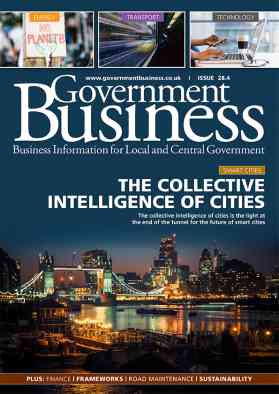
Government Business 28.04
Local action on tackling climate change
It is now less than 100 days until representatives from around the world will gather in Glasgow for Cop26
Prime Minister Boris Johnson has been accused of missing in action, Cop26 President Alok Sharma has been found to have flown to 30 countries in the past seven months, which, when combined, stretches to 200,000 air miles, and Allegra Stratton, Johnson’s climate change spokesperson, has openly discussed why she chooses to drive a ‘third-hand’ diesel Volkswagen Golf.
But, do not despair. Away from the doom and gloom of Westminster, change is happening at a local level.
In this issue we share the views of Rachel Coxcoon on some of the community-based initiatives changing the perception of climate and energy policy, Charlie McNelly and Rob Franklin explain how local authorities can embark on their net zero journeys, and James Goodman explores the importance of empowering communities to take action towards restoring nature in their local areas.
The pandemic has highlighted the inequalities that blight our regions, but it has also shown how change can progress undeterred when people come together to improve the lives of their communities. Let’s hope that local action will be recognised and encouraged in the lead up to Cop26, and that those currently ‘missing in action’ give it the focus it deserves.
Michael Lyons, editor
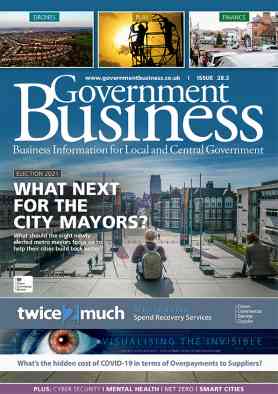
Government Business 28.03
COP26 and maintaining Net Zero urgency
There was news this week that ten trees for every person in Glasgow City Region will be planted as part of a new urban ‘forest’.
As the city prepares to host COP26 in November, the pledge equates to approximately 18 million trees being planted over the next decade, increasing woodland cover in the region from 17 per cent to 20 per cent. The pledge is being viewed as an ideal opportunity for Glasgow City Region to demonstrate its commitment to reaching Net Zero.
It is refreshing to see that the urgency and eagerness to continue the progress made on lowering emissions and creating sustainable cities and communities has not dampened as restrictions have eased.
Recent research from Global Action Plan found that two-thirds of young people are worried about how air pollution will affect their health, while a group of metro mayors and council leaders, part of UK100, have stressed that the UK will struggle to reach its climate change targets unless more power and money is put into local hands.
It is important that this stays on the agenda, which is why the online NetZero GOVERNMENT event on 17 June will be key in highlighting the need to neutralise public sector emissions by 2030 and those of residents and businesses by 2045.
Michael Lyons, editor
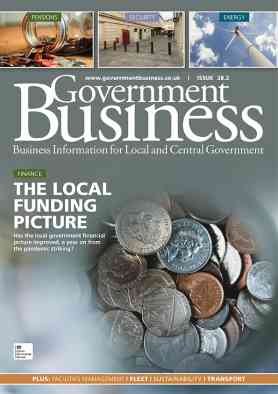
Government Business 28.02
Remote council meetings to be abandoned
Local authority meetings will have to be face-to-face from 7 May, under new guidance from the MHCLG.
For the most part, the government is being very cautious in its roadmap out of lockdown. Although outdoor sports facilities are now open, entertainment, tourist and non-essential retail all remain closed until at least 12 April. Meetings of groups of more than six is unlikely before 17 May, and even then it is expected to remain capped at six indoors and no more than 30 outdoors.
It is quite surprising then that the government has said that emergency legislation regarding virtual council meetings will not be extended beyond 7 May - earlier than the 17 May date mentioned above. It is also earlier than the 21 June date that MPs can continue participating remotely until.
Although guidance has been updated to help them operate safely and securely, including using existing powers to reduce the number of face-to-face meetings deemed necessary, it is not surprising that many local government bodies, including the Local Government Association and the County Councils Network, have labelled the move disappointing.
There are question marks over whether council chambers will have enough room to sufficiently distance all those present, raising the possibility of having to hire larger premises.
As the CCN’s David Williams said, the decision is ‘illogical’ at best.
Michael Lyons, editor
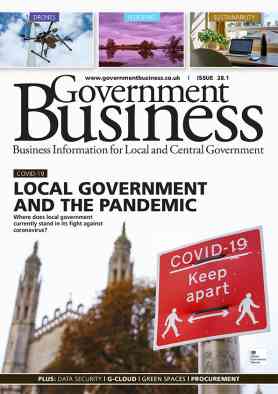
Government Business 28.01
Positives for local gov
There hasn’t been much over the last year, but there has been some positive news to local government this week.
The local government finance settlement has been confirmed, with much-needed access to an extra £1bn for social care to help support vulnerable adults and children. On top of this, Health Secretary Matt Hancock has announced NHS reforms, with ministers seeking to advance the way in which councils and NHS services set up bodies that can make decisions about how to join up services. Although this has been happening for a number of years now already, having government backing can only be a good thing.
Although incredibly overdue, there is now central government funding available for the removal of unsafe cladding for all leaseholders in high-rise buildings, backed by an investment of £3.5bn, whilst the Cabinet Office has said that the government pledge to raise billions of pounds by selling off surplus land and buildings which were no longer needed by the public sector has been exceeded.
But, perhaps most importantly of all, as many as nine in 10 local authorities in England have now signed up to the community coronavirus testing programme to offer regular targeted testing for people without symptoms.
Whilst hospital data still provides stark warning against complacency, there is no denying that involving local authorities in testing and tracing in their communities has boosted the reach of the government’s programme, and with vaccine targets likely to be met the ongoing need for local assistance will only grow. Their unrivalled knowledge and connections must be properly utilised moving forward.
Michael Lyons, editor
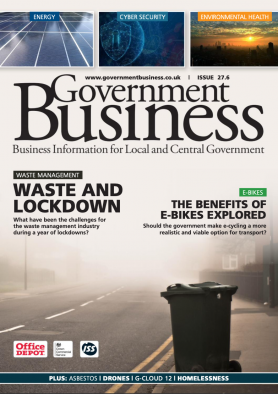
Government Business 27.06
Can 2021 be the year of Net Zero progress?
In the last few weeks, the eye catching announcements have been numerous - Brexit trade talks ongoing; more than 70 per cent of the country set to be Tier 3 restrictions; and community testing rolled out to Tier 2.
All of this, whilst of the upmost importance, means that other news stories have been overlooked. One of which was made by UK100, who announced that 38 regional leaders, including city mayors and council leaders, are signing the UK100 Net Zero Pledge, explicitly committing them to neutralising their emissions by 2030 and those of their residents and businesses by 2045 - essentially, pledging to move quicker than Whitehall.
With the coronavirus pandemic hitting public services hard and shifting government focus away from other areas, it is possible that some of the climate awareness and support that came to the fore in 2019 has dropped this year - which makes pledges such as this even more important.
Ahead of the COP26 climate summit in Glasgow, let us hope that next year we can see more local efforts to reach Net Zero. As Polly Billington, director of UK100, said: ‘Local leadership, alongside funding and powers, is key to winning the Race to Net Zero’.
We wish all of our readers, contributors and supporters a safe and enjoyable Christmas and best wishes for a happy New Year in 2021
Michael Lyons
Editor
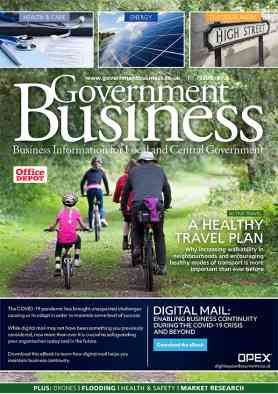
Government Business 27.05
Are local powers key to fighting coronavirus?
A few days ago, Andy Burnham, the Mayor of Greater Manchester urged the government to hand more powers to local authorities to help retain public support and tackle rising numbers of coronavirus cases across the country.
Burnham is not shy about calling out ministers for their shortcomings. In recent months he has campaigned for payments for people self-isolating, a simplification of lockdown rules, better access to testing and for the government to reconvene Cobra as a matter of urgency with places for all of the English regions.
All of his suggestions seem both logical and entirely feasible. But what is attainable is not always what is deemed possible by a government who seem to have lost all sense of logic. Manchester may be an obvious example and Burnham a vocal critic, but you can look at cities from across the UK and see the same problems and local leaders seeking the same assistance and clarification.
With the furlough scheme set to close and Test and Trace seeming to be deteriorate in success by the week, surely the need to look local is well and truly upon us. Local areas in tiers 2 and 3 must be able to request local control of the Test and Trace system, with resources transferring from the national system. If not, winter will be unmanageable.
Michael Lyons, editor
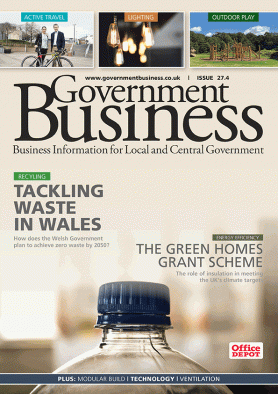
Government Business 27.04
Lockdowns show lack of empathy for the north
It has been two weeks since more than four million people in the North of England awoke to news that new restrictions had been imposed upon them overnight, following spikes in coronavirus cases.
Health Secretary Matt Hancock’s 10pm brainwave tweet to announce lockdowns was rightly met with widespread derision.
As we go to print, Oldham has become the latest region on the brink of local lockdown after the town’s seven-day infection rate overtook the ones in Blackburn with Darwen and Leicester.
Surely more needs to be done to understand why England’s worst-affected areas are largely concentrated in the north of the country - Manchester, Rochdale, Tameside, Pendle, Middlesbrough. These areas of high infection are generally areas of high deprivation, and instead of blaming those flouting social distancing, which is another argument for another time, government action is needed to ensure that the marginalised and vulnerable get the support they need.
The recent decision to strengthen regional contact tracing, whilst overdue, will not solve the issue on its own. Blaming those who choose to work rather than self isolate only highlights the lack of empathy Westminster has for our northern communities.
Michael Lyons, editor
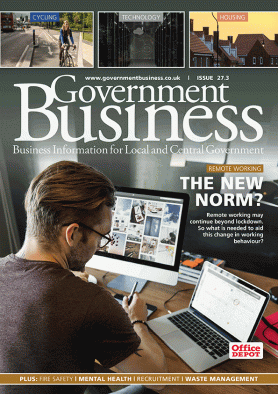
Government Business 27.03
The New Norm?
Remote working may continue beyond lockdown. So what is needed to aid this change in working behaviour?
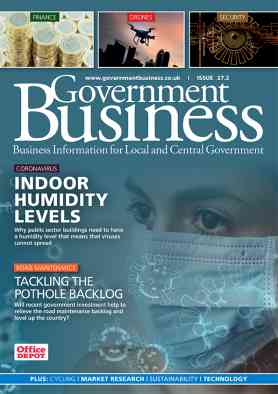
Government Business 27.02
CORONAVIRUS
Indoor Humidity Levels - Why public sector buildings need to have humidity level that means that viruses cannot spread
ROAD MAINTENANCE
Tackling The Pothold Backlog - Will recent government investment help to reliev the road maintenance backlog and level up the country?
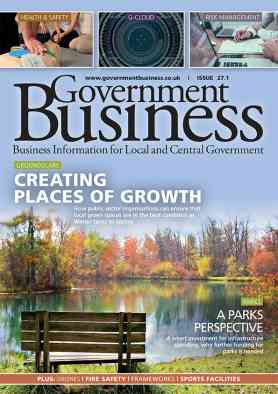
Government Business 27.01
GROUNDSCARE
Creating Places of Growth - How public sector organisations can ensure that local green spaces are in the best condition as Winter turns to Spring
PARKS
A Parks Perpective - A smart investment for infrastructute spending, why further funding for parks is needed
Pages
Company Focus
Just Lanyards is a subsidiary name of Gifts 2 Impress Limited, who have been trading for over 25 years, we therefore pride ourselves in having endless experience covering all aspects of the promotional merchandise industry.
Event Diary
UKREiiF has quickly become a must-attend in the industry calendar for Government departments and local authorities.
The multi-award-winning UK Construction Week (UKCW), is the UK’s biggest trade event for the built environment that connects the whole supply chain to be the catalyst for growth and positive change in the industry.
Supplier Profiles
Geo Energy
At GeoEnergy Design, we're on a mission to disrupt the traditional way heating and cooling ha
Latest Features
Professor Harith Alani, director of the Knowledge Management Institute at the Open University explains how AI can be used for good and bad.
Alex Lawrence, head of health & social care, techUK sets out techUK’s Five Point Plan for CareTech.












